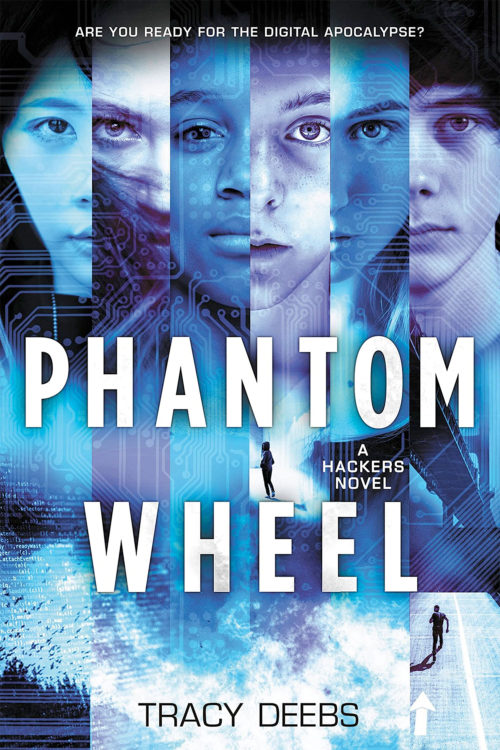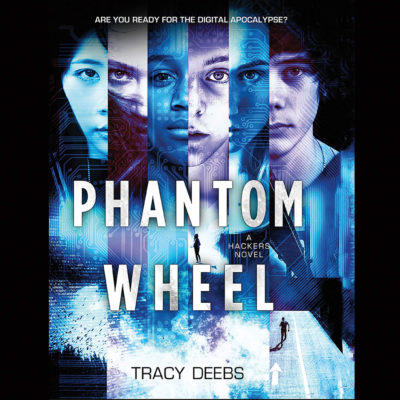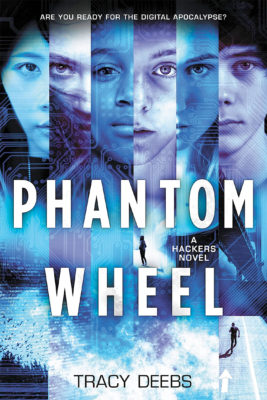Phantom Wheel
The digital apocalypse has arrived and the future is here in this addictive technological thriller full of twists and turns. Perfect for fans of Nerve!
Being recruited by the CIA to join a top-secret intelligence program should be the opportunity of a lifetime. For Issa, it’s a shot at creating a new and better life for herself and her siblings. For clever con artist Harper, it’s a chance to bury the secrets of her troubled past and make sure that those secrets stay buried. But for Owen—honor student, star quarterback, and computer-hacking genius—it sounds like a trap.
He’s right.
Owen discovers that instead of auditioning for the CIA, they’ve all been tricked by a multibillion-dollar tech company into creating the ultimate computer virus. It’s called Phantom Wheel, and it’s capable of hacking anyone on Earth, anywhere, at any time. And thanks to six teenagers, it’s virtually unstoppable.
Horrified by what they’ve done, the hackers must team up to stop the virus before the world descends into chaos. But working together is easier said than done, especially as the lines start to blur between teammate, friend, and more than friend. Because how do you learn to trust someone when you’ve spent your entire life exploiting that same trust in others?
Order Hardcover
Order Paperback
Read an Excerpt
1
Issa
(Pr1m4 D0nn4)
I can’t believe I’m here.
Seriously. I. Can’t. Believe. I’m. HERE!!!!!!!!!!!!!!!!
Three days ago I was changing my little sister’s dirty diapers in between calculus problems in our crappy apartment in San Antonio, and now I’m climbing out of the back seat of a limo in L.A. It doesn’t seem real.
But it is real, I tell myself as I thank the driver before making my way up the sidewalk to the security guard who waits for me at the open door. Discreetly, I reach down and pinch myself.
The pinch hurts, but not enough, so I do it again. Just to be sure that this is real. Just to be sure that I really have a shot at making my dreams come true—if I don’t screw up.
Not that screwing up is an option, because it isn’t.
With that thought in mind, I plaster a smile onto my face as I approach the security guard, who watches me make my way into the building with narrowed eyes.
“I’m here for the college program,” I tell him, forcing a steadiness into my voice that I’m far from feeling. “My name is—”
“I know who you are, Ms. Torres.” If possible, his eyes narrow even further as he looks me over from head to toe like I’m some kind of criminal.
Which I am, I suppose. One more reason why it’s so unnerving to be waltzing through the front door of the CIA’s Los Angeles headquarters.
“You can check in with the receptionist at the desk. She’ll get you a name tag, and then an agent will escort you up to the conference room.”
Escort, of course. Because letting a bunch of hackers run around on their own in a major CIA office isn’t the smartest move. Even if you are auditioning those hackers for some top-secret intelligence program…
“Thanks,” I tell him with a nod before doing as he says. I kind of expected there to be a line, a bunch of kids like me waiting for their big chance to impress the CIA in return for a full ride to college and a guaranteed job upon graduation.
But there’s no one in the lobby who doesn’t appear to work here. Two security guards, the receptionist, and a janitor cleaning the big picture windows at the front. I hope it means I’m early and not late.…
“ID, please?” the receptionist says as soon as I approach the long wraparound counter where she’s sitting.
I fumble in my bag for my wallet. As I pull out my license, I notice the receptionist—who is dressed in the most boring gray suit ever—glaring at the colorful sugar skulls and safety-pin chains on the front of my purse.
Note to self: The CIA really isn’t into creative expression.
I prop my purse up on the counter so she can get a better look at what she so clearly disapproves of. Then wait semi-patiently for her to run my license through a thousand-dollar ID scanner. Seconds later, a badge pops out. I nearly freak when I realize it has not only my name on it, but also my handle: Pr1m4 D0nn4.
Seeing it out there like that makes me sweat a little. I mean, obviously they know who I am or I wouldn’t be here, but still. I’ve never claimed my handle publicly before, and I’m not crazy about doing it now. In a government building.
Then again, that could be the point, right? This is the CIA, and maybe they want to see how I react to having a curveball like this thrown at me.
The receptionist watches, eagle-eyed, as I peel the backing off the label and start to press the tag onto my hip. No need to advertise any more than necessary, after all.
But she stops me with a shake of her head and a sharp, “No! It needs to go on your chest.” She pats her own gray tweed lapel to ensure that I understand. I do.
After my name tag is in its CIA-approved place, she gestures toward the elevators to our right. “Agent Carstairs will escort you upstairs.”
Before she’s even done speaking, the elevator doors glide open, and a tall, dark-skinned man in a navy suit is standing there, face carefully blank, eyes alert.
I try to introduce myself, but I don’t get any further than “Hi, I’m Issa—” before he cuts me off.
“I know who you are, Ms. Torres. Please come with me.”
Ooooooookay. So everyone here is in we-know-more-than-you-do mode. Which is true—I’m not denying that. But it still makes me want to pull out my gear and take them down a few pegs. They aren’t the only ones who know things, like how to access information that others can’t.
I step onto the elevator instead. This is an audition, after all. I’ll get to show them exactly what I know—and what I can do—soon enough.
Agent Carstairs doesn’t speak as the elevator swishes us up to the fourth floor. Nor does he speak as he leads me down a long hallway lined with official-looking pictures of official-looking people—former CIA directors, according to the plaques beneath the frames.
The enormity of where I am sinks in a little more with each step I take, with each picture we pass, and my stomach starts to flip-flop. Normally I’ve got mad confidence in my skills, but I want this too much. Suddenly I’m terrified that I’m going to make a mistake and end up back in San Antonio, hacking test sites to help my dad make ends meet.
Don’t screw this up.
Don’t. Screw. This. Up.
Don’tscrewthisup.
The words are a mantra in my head, a beat in my blood, and they’re ramping me up a little higher with each step we take. Thank God we get to the end of the hall before I go into total and complete freak-out mode. It’s close, though, and I concentrate on taking deep breaths as we pause outside a door labeled CONFERENCE ROOM 1A.
Agent Carstairs glances at me before he pushes the door open. I expect him to lead the way, but he gestures for me to cross the threshold, so I do, trying my hardest to look like I belong here.
Seconds later the door closes firmly behind me.
I am on my own.
A man in a brown suit at the front of the conference room turns to look at me, as do the five people sitting around a long table. My stomach sinks a little as I look back and forth among them, but I don’t let it show. Instead, I square my shoulders and paint a badass look on my face, trying not to notice that there’s only one seat left—which means I’m the last to arrive. Late, not early. Fantastic.
“Issa, glad you’re here,” the man at the front of the room says as he gestures me closer. “We’ve been waiting for you. Please take a seat so we can get started.”
“Sorry I’m late,” I say. “My flight was a little delayed.” I couldn’t control that, so I don’t know why I’m apologizing, but I feel like I’m at a disadvantage walking in last.
“You’re not late,” he assures me with what I think is supposed to be a smile but most definitely is not. “But please do take a seat so we can begin.”
“Wouldn’t want to get a minute off schedule,” one of the guys mutters as I pass. He’s big, with mocha-colored skin and killer dreads. He also looks like he’s about to get a root canal instead of audition for an all-expenses-paid trip to college with a job waiting for him after graduation.
He’s hot, I’ll give him that, but he’s wearing his bad attitude like a shield, and I so can’t afford to be associated with that right now. Which is why, when I take the empty seat next to him, I try to subtly scoot my chair as far away from him as I can. The smirk on his face tells me that he notices. I subtly try to scope out his name tag, but I can’t read it without being really obvious.
“All right, then. Let’s get started,” the agent at the front of the room says. “For those of you who just got here”—he glances at me—“I’m Agent Shane Donovan, and I’ll be guiding you through the activities today. First of all, I’d like to say how pleased we are that you accepted our invitation to join us. Because we need people like you to help us find our way through the difficult years ahead.”
His voice is booming now, bouncing off the oatmeal-colored walls, and I try to block out everything else and listen carefully.
“We’re at war, ladies and gentlemen, right now, this very minute. Not just in Afghanistan. Not just against ISIS. But against cyber terrorists who want to bring down the United States of America for political, economic, and social reasons. And have no doubt—they are everywhere, and they are gunning for us. We are in jeopardy. Our way of life and our place in the world are in very real danger, and we’re looking to you, and others like you, to help save us.”
He pauses and takes a sip of coffee from a plain white mug. He remains silent as we wait for him to continue, then drains his coffee before very deliberately setting the cup on the table.
“We’re only looking for the best for this program,” he tells us, turning his head so that he can take turns looking each one of us in the eye. “And according to our research, you six are the very best in your age group at what you do. Which—if you pass our tests—is why we want the chance to train you over the next several years and eventually give you a place at Langley, if you’re good enough.”
A guy at the front of the room—who looks more slick than any hacker I’ve ever seen—shifts at that, like he wants to say of course he’s good enough. He doesn’t, though, and Agent Donovan continues.
“These are dark and dangerous days,” he tells us, voice grave and body ramrod straight. “Your country needs people like you to act as our last line of defense against those who want to bring it down.”
All of this sets my teeth on edge a little, if I’m being honest. I don’t like the CIA—no hacker does—but I dislike being poor even more. And since we’re talking about access to the best equipment in the world here, I can overlook the rest. Especially since all our activities will actually be government sanctioned.
No more looking over my shoulder.
No more waiting to be arrested for hacking my way into some classified database to make a few bucks to help put food on the table at home.
No more worrying about what will happen to my family if I’m not there to watch out for them.
Add a college scholarship to the mix and a job after graduation, and it’s like I’ve won the lottery. If listening to a bunch of pro-government propaganda is the price of the ticket, I will gladly pay it.
Still, he’s droning on and on about stuff that doesn’t seem to have anything to do with the actual test we’re here to take, so I let my mind wander just a bit, making sure to keep one ear open for when he actually starts to give us instructions.
I glance around the room. Photos of the president, the CIA director, and the deputy director hang at perfectly spaced intervals on the walls, along with all five (former and present) directors of national intelligence. At the front of the room is the official seal of the president of the United States, and underneath is the official motto of the CIA: “The work of a Nation. The Center of Intelligence.” Meanwhile, the back wall is covered with what my research on the CIA has taught me is the agency’s unofficial motto, written in huge black letters that stand out against the light-colored walls: AND YOU SHALL KNOW THE TRUTH AND THE TRUTH SHALL MAKE YOU FREE. (JOHN 8:32)
Seeing those words puts me a little at ease, since hacking is all about truth. Most people think hackers are bad, and some definitely are. But most of us are in it because we don’t like secrets. We want to know everything, want to see everything. Curiosity might have killed the cat, but it’s fueled just about every hacker who ever lived.
A quick glance at the others as they perch on the edges of their red leather rolling chairs tells me they look as excited to be here as I am. Well, except for the guy with dreads, who looks more and more like he swallowed a lemon with each word that comes out of Agent Donovan’s mouth.
He even goes so far as to pull out his phone and scroll through it. I watch him surreptitiously, a little amazed that he’s got the guts to be screwing around in front of Agent Donovan. Then again, I don’t know anything about him, nor do I care. I’m here for me.
Agent Donovan pulls out some black folders and begins handing them out.
“What are these?” the guy with dreads asks as he shoves his phone back in his pocket.
“Your assignment,” Agent Donovan answers, handing me the last folder.
I take it with trembling hands. This is it. This is my big chance, right here. Right now.
I flip open the folder and start to read, but before I can do much more than glance at what’s inside, the guy beside me tosses his folder on the table and grabs his bag.
“What are you doing?” Agent Donovan demands.
“Not wasting my day doing this BS, that’s for sure.” He stands up and rips off his name tag and shoves it into his pocket before I can even see what it says. Then he heads for the door.
I’m staring at him in shock—as are the rest of the people in the room—when suddenly Agent Donovan moves to block his way. The fact that the guy is four inches taller than the agent makes their whole nose-to-nose showdown kind of comical—or it would if I could stop trying to figure out what’s happening and just enjoy the show.
“You need to sit down,” Agent Donovan orders.
“Like I’m going to listen to you,” the guy responds.
“You’re here for an audition.”
“Yeah, well, I just got stage fright. Sue me.” He shrugs like he doesn’t have a care in the world.
“You need to do what I say.” Agent Donovan sounds as angry as he looks.
“No, I don’t. But you do need to move before I move you.” He doesn’t even flinch as he waits to see what the CIA agent is going to do.
The rest of us wait too, breath held and shoulders tense.
A stare-down ensues, and I swear you could hear a pin drop in the room as we all wait for the explosion. Agent Donovan doesn’t look like the kind of guy who’s used to people giving him attitude. Plus, the CIA paid for us to come all this way for an audition. The least this guy can do is hold up his end of the bargain.
In the end, though, Agent Donovan just steps aside and lets him leave. “Don’t count on us to give you a ride back to the airport.”
The guy just laughs. “Dude, I wouldn’t count on you to know what a command prompt is, let alone how to access it, and neither should anyone else in this room.”
He turns and looks straight at me. For a second it seems like he wants to lay into me—into all of us—but he just shakes his head and says, “When something seems too good to be true, it probably is.”
And then he’s gone, closing the door behind him with a firm thud and leaving the rest of us to stare anywhere but at Agent Donovan as we try to figure out what just happened.
As I wait for Agent Donovan to say something, anything, the guy’s words replay over and over again in my head.
When something seems too good to be true, it probably is. When something seems too good to be true, it probably is. When something…
I try to block them out—try to block him out. Because he can’t be right. He just can’t be. I need this to be true too much.
“All right, now that we’ve gotten rid of the deadweight,” Agent Donovan finally says, “grab some snacks off the table in the back, and I’ll show each of you to the rooms where you’ll be working.” He walks to the door and opens it, steps into the hall, and waits for us to pick up drinks or candy bars and follow him like good little soldiers.
Which we do. All five of us.
Just the thought grates a little—I’m not big on making waves for no reason, but I don’t like not knowing what’s going on either. Especially after what just happened. But what else are we supposed to do but follow Agent Donovan wherever he wants to take us?
I need this program and the scholarship it provides way too badly to mess it up just to make a point. Better to keep my head down and my mouth shut, at least until I’ve done what they brought me here to do.
I’m so busy concentrating on the floor and trying to avoid my own thoughts that I bump into one of the other good little soldiers.
The guy jumps a little, then apologizes to me—even though I very clearly bumped into him—with a smile on his face. I smile back. I like him, and the well-trimmed red Mohawk he’s sporting. His badge says his name is Seth Prentiss.
I think about introducing myself, but Agent Donovan is walking fast, his polished mahogany wingtips eating up the hallway one decisive click at a time. He stops suddenly and gestures to a room on his right. “Issa, this is your room. Everything you need to accomplish your task should be in there. If you’re missing anything, you can call me on the number provided inside your folder, or you can improvise.” His tone tells me which of those I should do.
“Thanks,” I answer, opening the door and stepping inside. I turn, start to ask about a password on the computer, but Agent Donovan is already making his way down the hall with the others.
Okay, so no questions and no lifeline. No problem. I’ve been making my own lifelines for a while now. Why should today be any different?
As I move to close the door, another man walks down the hallway. He’s tall and old looking—silver hair, wrinkly face—and if I were somewhere else, I probably wouldn’t even notice him. But considering his suit looks like it cost more than a year of college tuition, I can’t help being interested. I thought government employees didn’t get paid enough to afford clothes like that.
He nods when he notices me staring, but doesn’t say anything. Neither do I. I just watch as he walks by like he owns the place—head up, shoulders back, face totally impassive.
I close the door, then take a moment to stretch out my neck and fingers and look around the room. Everything in it is government-issue gray—the desk, the chair, the carpet, the state-of-the-art Jacento computer, even the walls.
Who paints walls gray, anyway? I wonder as I slowly make my way to the desk. And yes, I’m well aware that I’m stalling. Now that it’s all spread out before me, I’m nervous. Really, really nervous.
Not because of my task—I glanced through the folder when Agent Donovan handed it to me, and I’m pretty sure it’s not going to be a problem—but because so much is riding on this. This offer dropped out of the sky when I needed it most, and if I blow it, then I’ve got nothing.
I’m not going to let that happen, not going to spend the rest of my life like my father, pining for a future that slipped through my fingers. This is my golden ticket, and I’m holding on to it with everything I’ve got.
This thought is the reminder I need, and it steadies me. It also gives me the courage to sit down in the ergonomically correct gray chair.
I flip open the folder, take a few deep breaths, and study the instructions more closely. My nerves settle. Because while there are a lot of big words that make the hack sound super complicated, the truth is, it’s really not. I’ve run this kind of game hundreds of times in hundreds of different systems. It’s all about the code, and I have a bunch of pretty, pretty codes up my sleeves.
Usually I’m all about finesse—I like my hacks to be as stylish as they are effective. But even though it says on the first page in the folder to take our time, that doing it right is more important than doing it fast, I can’t help feeling like this is a race. Four other people are out there, all of whom are probably doing this exact same thing. I don’t want to be the last one in the door—especially when I don’t know how many open spots they have in the program.
With that thought in mind, I turn on the computer. I’ll do whatever it takes to get my shot, even if it means brute-forcing my way into this thing.
The second the screen comes up, I bite back a groan. Seriously? They seriously gave me a computer that runs Windows to do this stuff? It’s bad enough that they don’t have Wi-Fi, that they keep us tethered to Ethernet like a bunch of lamers. But Windows? It’s like they’re some small-town sheriff’s office instead of the freaking CIA.
For a moment I wonder about the practicality of wiping the computer—installing Linux in place of Windows so I can actually do what I need to do with about a million times less hassle. But the clock keeps ticking in the back of my head, and doing that will take waaaaaaay too long, no matter how state of the art the system is.
Maybe that’s part of the test. Windows takes triple the time Linux does because of the way I have to format commands—but maybe that’s what they want. To measure how we do when we’re not in our comfort zone, using equipment that isn’t our own and an operating system that sucks.
The computer is password protected, just as I thought. A quick look through the desk shows that there’s nothing in it at all—they either emptied it out for us or this office is dedicated to auditions and interviews.
The thought makes me even more nervous, and I give up on finding the password and turn my focus instead to breaking in. It’s not the easiest thing to do, but it’s not impossible either—if you know what you’re doing.
I’ve spent years making sure I know exactly what I’m doing.
I strike a few keys, get to the command prompt behind Windows. Then I enter a few lines of code that let me establish a back door into the system. A few more lines of code help the OS recognize the back door, and from there it’s a simple matter to circumvent the password.
“Automagic, baby,” I crow before it registers that they might be recording me. Once it does, I keep my fist pump to myself, but it’s hard. I glance at the clock on the wall—less than five minutes and I’m in.
Once I’ve got control of the system, I write a few lines of code in Python just to test things out. I can program in the C languages and Java, but I much prefer Python since it cuts repetition down to bare bones—and the time saved is totally worth the installation time.
As soon as I’m up and running, I search the network’s IP addresses with my favorite mapping tool, looking for any open ports. Every single server they gave me has at least one open port, and though I have no idea where the servers lead (they’re just blind addresses to me), I spend a minute ranking how easy they are to access based on my own strengths and weaknesses. It’s not foolproof considering I’m not in any of their systems yet, but I’m betting when all is said and done, I’ll only be off by one or two, at most.
I’ve been doing this long enough to know what I’m talking about.
Grabbing a clip from my bag, I push my hair up and out of my eyes. And then I get to work.
I’ve always been a girl who likes a challenge, so I tackle the hardest first.
I start by Burp Suiteing it. I prefer Aircrack-ng, but Windows. Ugh. I bite back a groan and start searching for a point to exploit.
Time begins to fly by, as it always does when I do my thing. The hack is a lot of munching. I didn’t expect to have to do so much exploration when I first saw the gig, but I roll with it, IRPing where I can and patching where I can’t. I eventually hit my groove, and three and a half hours later, I’m Netcatting the last server.
I don’t want to make any mistakes, so I’m taking my time. But it’s hard once I start hearing doors open in the hall. The others are finishing, and I’m still in here, working on this last stupid exploit.
And the exploit is harder than I expect. Still, I stick with it, using my standard Python code to strong-arm a path to where I want to go. But the vulnerability I originally found isn’t nearly as wide open as I thought, and I’m starting to worry I’m going to have to find a zero day—which will take way more time than I’ve got. Hours, or even days.
I’m trying a bunch of different things—codes I’ve written through the years to get me through almost anything—when my phone pings. I want to ignore it, stay buried in what I’m doing, but I can’t.
I swipe it open, and my stomach falls through the floor when I see the text from my sister.
C has fever of 102
Not now, not now. Please not now.
Where’s Dad?
But even as I wait for an answer, I know what she’s going to type. Sure enough:
Dad’s sleeping
Is she drinking water or formula?
No
She’s really hot
God, God, God. Think, Issa, think.
OK. Give her baby Tylenol, from the bathroom cabinet. READ THE DIRECTIONS. I can’t remember how much to give her
Then rub her all over with a cool washcloth and let her stay in her diaper
Try to get three ounces of Pedialyte into her
Text me in forty minutes if she’s not better
Ok
I wait for her to text more, but she doesn’t, and I have a minor freak-out. Since my mom died, my dad’s been kind of out of it… okay, a lot out of it. Which is understandable. I mean, I get it. He takes his wife to the hospital, thinking he’s going to be bringing her and a baby home. Instead, he gets the baby and loses the wife to some freak complication during childbirth.
Within a few months of my mom’s death, my dad stopped working—I’m still not sure if he quit or was fired or is, I hope, on some sort of leave until he snaps out of this depression. All he does most days is sleep. I’ve begged him to see a doctor, to get help for his very obvious depression, but he keeps telling me he just needs time.
I’m not okay with any of this—I wasn’t a few months ago, and I’m not now—but it’s not like I get a choice. There’s a baby to take care of, plus the other kids. And since my dad can’t do the job right now, I do it. Most of the time, anyway.
Today is… an anomaly. Leaving Lettie in charge for the day shouldn’t be a big deal—she’s fifteen and has helped me out a bunch of times. But now Chloe’s sick, and Lettie shouldn’t have to deal with that alone. God. I need to finish this code so I can get out of here and back home.

















